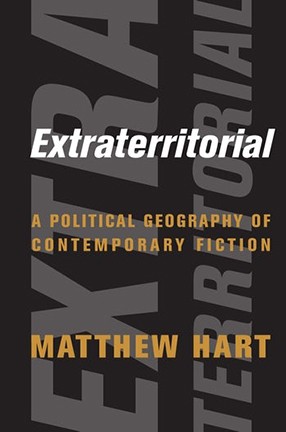

In Extraterritorial: A Political Geography of Contemporary Fiction, Matthew Hart, a professor of English and Comparative Literature, explains what happens when writers dream of an open, connected world, then confront the reality of elastic but tenacious borders. He presents a theory of literature that focuses on settings that fall outside of national boundaries, but enhance state power, spaces that cut across geography and history, yet do not point the way to a borderless world.
Here Hart discusses his new book with Columbia News, along with what he recommends for summertime quarantine reading, where he’s happiest settling down with a good book and who he would invite to a dinner party.
Q. How did you come up with the idea for this book?
A. The idea began several years ago, when my student, Tania Lown-Hecht, asked me to lead an independent study on the German writer W. G. Sebald. Tania and I started to notice how often Sebald used this strange word “extraterritorial.” I looked it up (it means, literally, “beyond the territory”), and checked that the word was the same in both the English translation and German original (it was). But none of that explained why this ugly bit of Latin jargon showed up so often in Sebald’s poetic and melancholy works. So Tania and I began looking into how and where he uses the word, which we were able to connect to all his most central themes. Most centrally, the word embodied how, in almost all Sebald’s stories and essays, characters who seem at first homeless actually suffer from never being able to become properly lost. They go beyond the territory, but they’re always tied, and usually fatally, to some idea of homeland or nation.
We eventually co-authored a journal article on Sebald, but the truth is that the idea wouldn’t have turned into a book without a further coincidence. At the same time I was researching Sebald, I read Kazuo Ishiguro’s novel, When We Were Orphans, which is set in the International Settlement of Shanghai during the 1910s and 1930s. That was a really weird and interesting setting: a space of imperial privilege and also a cosmopolitan center for media, finance, crime, nightlife, art, sex, fashion—you name it. The whole international system in Shanghai was underpinned by a system of extraterritorial jurisdiction, in which the foreign elites who ruled the city walked around in little bubbles of their own national law, with the English subject to English law, Americans to U.S. federal law and so on. Nobody needed to make colonial claims to land, like in Hong Kong or Singapore, because most foreigners had effective immunity from the Chinese state.
So that got me going: two major contemporary writers, both obsessed by extraterritoriality, which, it turns out, wasn’t just a complicated metaphor for exile, but a key legal and political technology in the making of the modern world.


Q. What do you mean when you say that the future of fiction is neither national nor global, but extraterritorial?
A. A basic premise of Extraterritorial—and this builds on my last book, Nations of Nothing But Poetry—is that we tend to misrepresent globalization as a crisis for the national state. It’s as if there’s a zero-sum game, where every step toward a more interconnected society equals a loss for national identity or state sovereignty. But that’s just false. In reality, national states and elites are among the biggest drivers of so-called global processes. States willingly compromise and puncture their territory to advance shared goals; they also regularly exert their authority overseas at the expense of the less powerful, both unilaterally and through ostensibly transnational institutions like the United Nations. The reality, especially if you pay attention to art and language, is that the national and the global are ceaselessly intertwined.
This is something that studying extraterritoriality shows very well. When you study spaces like international cities, airports or special economic zones—places in which “global” space is made by arrangements within and among states—then the political geography of the present becomes much easier to see. I think contemporary novelists and artists have known this for a while now, and it’s the job of my book to show why and how that’s the case.
Q. What are some other examples of extraterritorial spaces and how are they depicted in fiction?
A. Take these three examples. The first is the diplomatic embassy, which operates on a kind of legal fiction in which some bit of, say, India is given over to another state so that they can manage their political and commercial affairs without interference. The Brazilian embassy in New Delhi isn’t, in fact, a bit of South America in South Asia, but it helps everyone to pretend that it is. Embassies are extraterritorial in that they are places in which a country’s laws and customs are transferred beyond national territory through a mutual agreement between sovereign states.
The second example is outer space or international waters. These spaces are extraterritorial because, in them, no single person or state can claim sovereignty. They’re not beyond the law altogether; it’s just that, because they’re not subject to any one jurisdiction, they’re zones in which unusual sorts of freedom apply.
The third example, which is the most common, is a kind of quasi-extraterritorial space, in which some aspects of national law get suspended so as to better manage an aspect of global society. That might be the international departure hall of an airport, in which you’ve been deemed to pass beyond national tax and customs laws, so you get to buy cheap whiskey or watches. But it might also be a hellhole like the prison at Guantánamo Bay, Cuba, where people were subject to indefinite detention because the United States claimed “control,” but not “jurisdiction”—so the U.S. government argued that prisoners held there weren’t subject to the Bill of Rights.
There’s no single way these kinds of places get depicted in fiction. Some of the books I consider in Extraterritorial—for instance, Amitav Ghosh’s Ibis trilogy of historical novels—are highly realistic and draw on serious scholarly research. Others are truly speculative. A good example of the latter kind is China Miéville’s fantasy novel, The Scar, which is set on a floating pirate city that travels around the ocean. The book embodies a powerful dream about how we might imagine political communities that don’t make claims to land and sovereignty.
Q. What other writers and books discussed in Extraterritorial illustrate this approach to literature?
A. The chapter that discusses Ghosh begins with a section on Hilary Mantel’s Wolf Hall novels, which are set in the court of King Henry VIII of England and are, to my mind, among the best novels of the last few decades. They’re not, at first, obviously about extraterritorial spaces. But the whole Henry VIII dynastic drama—the scandalous sexual intrigue, but also the struggle over the religious reformation—was partly about how European states that historically tolerated multiple sovereignty claims slowly turned into spaces in which the king claimed authority over every aspect of land and law. That was quite new. It’s a story about how territorial forms of rule came to dominate political and legal cultures in which extraterritoriality was once very common. I think Mantel agrees with me that we’re now in a time much more like the late medieval or early modern period, in which the state is still very powerful, but in which the geography of power is increasingly complicated.
Q. What books would you recommend to readers during quarantine?
A. The Mirror and the Light, the last volume of Mantel’s Wolf Hall trilogy, recently came out. At almost 1,000 pages of tragedy and intrigue, it certainly kept me diverted for the first part of quarantine. I’m also obsessed by the subject of Extraterritorial‘s last chapter, the English novelist and short story writer J. G. Ballard, who wrote a lot about his childhood in extraterritorial Shanghai. My favorite books of his are the weird dystopias from the 1970s—Crash, Concrete Island and High-Rise—but his autobiographical novels about China are also essential reading for people trying to come to grips with the nature of power in the present.
Q. What are some other great books that you have read recently?
A. Probably Hannah Arendt’s The Origins of Totalitarianism, which I taught at the end of the spring semester of Contemporary Civilization. Also, Sally Rooney’s Normal People and Conversations with Friends, which I just wrote a short essay about for a journal called Post-45.
Q. What is on your summer reading list?
A. In this moment of serious fiscal crisis for universities, I’m reading Dean O. Smith’s How University Budgets Work. I’m also waiting for my wife to finish Jenny Offill’s Weather, which I’ve heard amazing things about, and I’m planning to finish re-reading everything by Rachel Cusk and Anne Boyer in time for a new graduate seminar that will feature work by innovative women authors.
Q. Do you read actual books or e-readers?
A. Both, but always actual books if it’s something I’m studying or teaching, since I still make tons of notes in the margins and on the covers. For pure pleasure reading, I listen to audiobooks while I’m hiking with my dog.
Q. What is your ideal reading spot?
A. On the couch with my dog, and nobody else around. Second place would be on the Metro-North quiet car, heading into Manhattan from Cold Spring, on a three-person bench seat that I have all to myself.
A. You’re hosting a dinner party. Which three professors or academics, dead or alive, would you invite and why?
A. I’m going to play the local card here and nominate three brilliant Columbia intellects, any one of whom would enliven the most boring party: the poet and critic W. H. Auden, the cultural anthropologist Margaret Mead and, to split the difference between them, Zora Neale Hurston, who was both an anthropologist and one of the great writers of the last century.







































